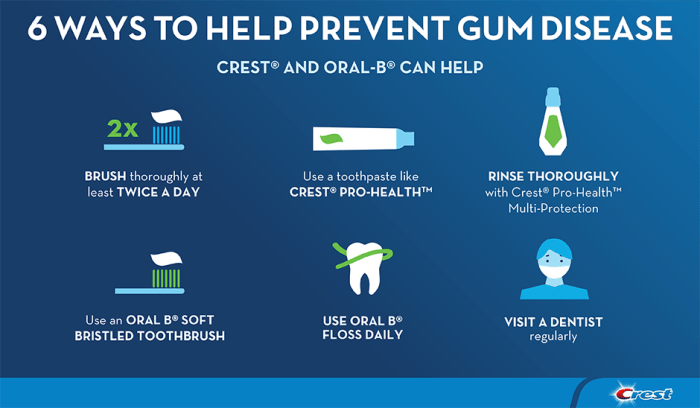
How to prevent gum disease with good oral hygiene sets the stage for this enthralling narrative, offering readers a glimpse into a story that is rich in detail and brimming with originality from the outset. It delves into the crucial aspects of maintaining oral health through effective practices and preventive measures.
Readers will discover a comprehensive guide on the significance of preventive care, the role of diet, the importance of regular dental check-ups, lifestyle habits, herbal remedies, and integrating gum health with wellness programs, all aimed at promoting healthy gums and overall well-being.
Importance of Preventing Gum Disease

Preventing gum disease is crucial for maintaining good oral health. It not only affects the gums but also has a significant impact on the teeth and overall well-being of an individual.
Impact of Gum Disease on Teeth and Gums
Gum disease, also known as periodontal disease, can cause various issues such as inflammation, bleeding gums, bad breath, and eventually lead to tooth loss if left untreated. It can also affect the bone structure that supports the teeth, resulting in loose teeth and difficulty in chewing.
Prevalence of Gum Disease Worldwide
Gum disease is a common oral health problem globally, with approximately 20-50% of the population affected by some form of gum disease. According to the World Health Organization, severe periodontal disease is the 11th most prevalent disease worldwide.
Good Oral Hygiene Practices
Maintaining good oral hygiene is essential for preventing gum disease and maintaining overall oral health. By following a consistent oral care routine, you can significantly reduce the risk of developing gum problems and other dental issues.
Brushing and Flossing Regularly
- Brush your teeth at least twice a day using fluoride toothpaste. Make sure to brush for at least two minutes each time to thoroughly clean all surfaces of your teeth.
- Use a soft-bristled toothbrush to avoid damaging your gums and enamel. Replace your toothbrush every three to four months or sooner if the bristles are frayed.
- Don’t forget to floss daily to remove plaque and food particles from between your teeth. Flossing helps prevent the buildup of bacteria that can lead to gum disease.
- Consider using interdental brushes or water flossers if traditional flossing is challenging for you. These tools can help clean hard-to-reach areas effectively.
Mouthwash as a Complement to Oral Hygiene
While brushing and flossing are key components of good oral hygiene, using mouthwash can provide additional benefits and help enhance your overall routine.
- Choose an antimicrobial mouthwash that fights bacteria and helps reduce plaque and gingivitis.
- Rinse with mouthwash after brushing and flossing to reach areas that may have been missed and to freshen your breath.
- Some mouthwashes contain fluoride, which can help strengthen tooth enamel and prevent cavities.
- Consult your dentist or dental hygienist to determine the best mouthwash for your specific needs and to ensure you are using it correctly.
Role of Diet in Preventing Gum Disease
Eating a healthy diet plays a crucial role in maintaining good oral health, including preventing gum disease. The foods we consume can have a direct impact on the health of our gums, so it’s essential to be mindful of what we eat.
Foods that Promote Healthy Gums
- Crunchy fruits and vegetables like apples, carrots, and celery can help clean teeth and stimulate gum health.
- Dairy products such as milk, cheese, and yogurt are rich in calcium and can strengthen teeth and gums.
- Green tea contains antioxidants that can reduce inflammation in the gums and promote overall oral health.
- Foods high in vitamin C, like oranges, strawberries, and kiwi, can help prevent gum disease by boosting immunity and reducing inflammation.
Foods to Avoid for Preventing Gum Disease
- Sugary and acidic foods and beverages can contribute to the growth of harmful bacteria in the mouth, leading to plaque buildup and gum disease.
- Sticky candies and snacks can get stuck in between teeth, increasing the risk of cavities and gum infections.
- Highly processed foods that are low in nutrients can weaken the immune system and make it harder for the body to fight off gum disease.
Importance of Regular Dental Check-ups
Regular dental check-ups play a crucial role in preventing gum disease by allowing dentists to detect and address any oral health issues early on. These visits are essential for maintaining healthy teeth and gums, as well as preventing more serious dental problems in the future.
Significance of Dental Cleanings and Check-ups
- Dental cleanings performed during check-ups help remove plaque and tartar buildup, which can lead to gum disease if left untreated.
- Regular examinations by a dentist can identify any signs of gum disease or other oral health issues before they progress, allowing for timely intervention.
- Professional cleanings also help to prevent tooth decay, cavities, and other dental problems that can contribute to gum disease.
Recommendations for Frequency of Dental Check-ups
- It is generally recommended to visit the dentist for a check-up and cleaning every six months.
- However, individuals with a history of gum disease or other oral health issues may need to schedule more frequent visits as recommended by their dentist.
- Regular dental check-ups are essential for maintaining optimal oral health and preventing gum disease, so it is important to follow the recommended schedule set by your dentist.
Lifestyle Habits and Gum Disease Prevention
Smoking and Stress can significantly impact your oral health and increase the risk of gum disease. Making positive lifestyle choices and promoting overall wellness can help prevent gum disease.
Smoking and Gum Disease
- Cigarette smoke contains harmful chemicals that can weaken the immune system, making it harder for the body to fight off gum infections.
- Smoking reduces blood flow to the gums, leading to a lack of oxygen and nutrients that are essential for gum health.
- Smokers are more likely to develop severe gum disease, experience tooth loss, and have delayed healing after dental procedures.
Stress and Oral Health
- Chronic stress can contribute to inflammation in the body, including the gums, making them more susceptible to infection.
- Stress can lead to teeth grinding and clenching, which can damage the teeth and jaw muscles over time.
- Practicing stress-reducing activities like yoga, meditation, or deep breathing exercises can help improve overall oral health.
Promoting Overall Wellness for Gum Disease Prevention
- Follow a balanced diet rich in fruits, vegetables, whole grains, and lean proteins to support gum health and overall well-being.
- Stay hydrated by drinking plenty of water throughout the day to keep your mouth moist and wash away food particles that can contribute to gum disease.
- Exercise regularly to improve circulation and boost the immune system, which can help prevent gum infections.
- Get an adequate amount of sleep to allow your body to repair and regenerate tissues, including those in your gums.
Herbal Remedies for Gum Health: How To Prevent Gum Disease With Good Oral Hygiene
Using herbal remedies for promoting gum health has been a practice for centuries due to their natural properties and potential benefits in preventing gum disease. These remedies can be a great addition to your oral hygiene routine, but it’s important to use them with caution and understand their effects on your oral health.
Aloe Vera
Aloe vera is known for its anti-inflammatory and antibacterial properties, making it a popular herbal remedy for gum health. It can help reduce inflammation and soothe irritated gums when used in gel form. Simply apply a small amount of aloe vera gel to your gums and massage gently for relief.
Tea Tree Oil
Tea tree oil has antimicrobial properties that can help fight bacteria and prevent gum disease. It is commonly used in mouthwashes or diluted with water for a natural mouth rinse. However, it’s important to use tea tree oil in small amounts as it can be toxic if ingested.
Peppermint Oil
Peppermint oil is another herbal remedy that can help freshen breath and reduce bacteria in the mouth. It has been shown to have antimicrobial properties that can benefit gum health. You can add a drop of peppermint oil to your toothpaste or mouthwash for added protection.
Coconut Oil Pulling
Coconut oil pulling involves swishing coconut oil in your mouth for 10-15 minutes to reduce bacteria and improve gum health. This traditional remedy can help remove toxins from the mouth and promote overall oral hygiene. Make sure to spit out the oil after pulling and rinse your mouth with water.
Precautions
- Always consult with a healthcare professional before using herbal remedies, especially if you have existing oral health issues or are pregnant.
- Use herbal remedies in moderation and follow recommended guidelines for safe use.
- Discontinue use if you experience any adverse reactions or irritation in your mouth.
- Remember that herbal remedies are not a substitute for regular dental care and hygiene practices.
Integrating Gum Health with Wellness Programs

When it comes to overall wellness, many people tend to overlook the connection between gum health and their general well-being. However, the truth is that gum health plays a significant role in one’s overall health and can impact various aspects of wellness.
Importance of Integrating Gum Health with Wellness Programs
It is crucial to incorporate gum disease prevention into wellness programs to ensure that individuals are taking a holistic approach to their health. By addressing oral health, specifically gum health, in wellness programs, individuals can better understand the importance of maintaining good oral hygiene practices.
- Educating participants on the link between gum disease and systemic health conditions.
- Providing resources and information on proper oral hygiene techniques.
- Encouraging regular dental check-ups as part of overall preventive care.
Examples of Wellness Programs Focusing on Oral Health, How to prevent gum disease with good oral hygiene
Several wellness programs have successfully integrated gum disease prevention into their initiatives, highlighting the importance of oral health in overall well-being.
| Wellness Program | Approach to Oral Health |
|---|---|
| Corporate Wellness Program | Offering on-site dental screenings and educational workshops on oral hygiene. |
| School Wellness Program | Implementing oral health education in the curriculum and providing dental care resources for students. |
| Community Health Initiative | Organizing free dental clinics and promoting the importance of oral health in overall wellness. |
Last Point
In conclusion, understanding how to prevent gum disease with good oral hygiene is paramount in ensuring long-term oral health. By following the Artikeld practices and recommendations, individuals can take proactive steps towards maintaining healthy gums and a beautiful smile.
Query Resolution
How often should I brush and floss my teeth?
It is recommended to brush your teeth at least twice a day and floss once a day to maintain good oral hygiene.
Can diet affect gum health?
Yes, a balanced diet rich in nutrients can promote healthy gums, while sugary and acidic foods should be consumed in moderation to prevent gum disease.
Are herbal remedies effective for preventing gum disease?
Some herbal remedies like tea tree oil and aloe vera may offer benefits for gum health, but it’s essential to consult with a healthcare provider before using them.
How does smoking impact gum disease?
Smoking increases the risk of gum disease by affecting blood flow to the gums and compromising the body’s ability to fight infections.
What are some wellness programs that focus on oral health?
Wellness programs that incorporate oral health often include dental screenings, education on oral hygiene practices, and counseling on lifestyle habits that impact gum health.





